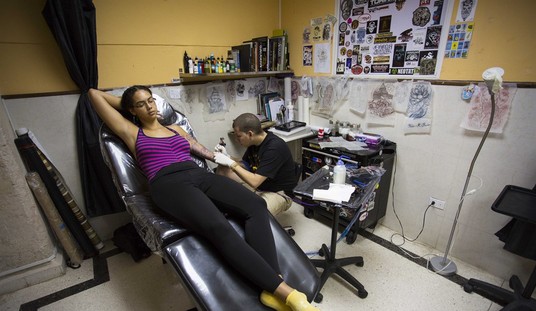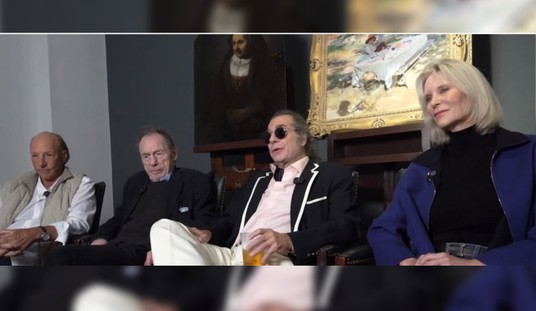In my former life, I walked in all kinds of Marxist moccasins over many miles and for many years, and I know for a fact that Marxism, no matter how disguised, always begins its way to power by preaching the need to change — a society, a country, a group of countries, the whole world. Of course, people everywhere want their leaders to do a better job than their predecessors did. But “change” is also the very quintessence of Marxism, which is built upon the dialectical materialist tenet that “quantitative changes generate qualitative transformations.” (Translation for the media savvy: If you say it often enough, it becomes the truth.)
In 2008 I could hardly believe my ears when “change” became the electoral motto of the Democratic Party’s campaign for the White House. “Change” was bursting forth everywhere like a biblical shibboleth, distinguishing that party from the rest of the world.
The leaders of the Democratic Party painted the United States of America, the undisputed leader of the Free World, as a “decaying, racist, capitalist realm” unable to provide medical care for the poor, to rebuild her “crumbling schools,” to replace the “shuttered mills that once provided a decent life for men and women of every race,” and it pledged to “change” it by redistributing its wealth. Our media jumped in, and transformed the Democratic Party’s “change” into a nationwide tsunami.
They say that a picture is worth a thousand words. Click here and have fun.
The frenzy over “change” brought back vivid memories to me of the campaigns I used to be involved with during my years in Romania promoting the election of Romanian tyrant Nicolae Ceausescu. “Change” was Ceausescu’s electoral motto, as well. When he came to power, he painted Romania as a decaying, corrupt, economically devastated country, and he pledged to “change” it by redistributing its wealth. That lie, repeated hundreds of times, became the truth. Of course, he certainly did “change” what had been the picturesque, pastoral country of Romania. Here is a sample of Ceausescu’s devastated, polluted transformation. Here is another. And one more. And another one.
I do not intend to compare the leaders of our Democratic Party with a monster like Ceausescu, but their common electoral motto gives me reason to believe that both arrived at their destination traveling in the same Marxist boat.
“Change” is not only the quintessence of Marxism, it is its credo as well. Marxists believes that the nationalization of the economy generates not only political and social changes, but spiritual changes. Eventually, these changes make Marxism a religion — the only religion permitted — and the Marxist leader the only god allowed. The religious adulation of Lenin and Stalin, which filled oceans of newsprint and generated international respect for Marxism and admiration for its leaders, may well be one of the greatest hoaxes perpetrated in history. Its lingering tentacles live on. Even today, visitors in Moscow wait patiently in long lines in order to pay their respects to Lenin’s embalmed body, which has been exposed as a holy relic in Moscow’s Red Square Mausoleum since shortly after his death in 1924.
My personal experience with a “spiritual” Marxist “change” began in September 1944, when the Soviet Red Army “liberated” the Kingdom of Romania from Nazi occupation. Stalin publicly portrayed that serene sovereign nation as a decaying capitalist country, and he began “changing” it into what he called “a Socialist paradise.” At that time I was not yet familiar with the organic connection between “change,” Marxism, and the nauseating cult of personality. Soon, however, my native Romania — an idyllic Francophile country whose capital, Bucharest, was nicknamed Le Petit Paris — was changed into a monument to the Marxist who was changing it. Stalin became Romania’s new god. Stalin portraits, Stalin statues, Stalin streets, Stalin boulevards, Stalin plazas, and Stalin factories sprouted up like mushrooms all over the country. Romania even got its own Stalin city.
In 1947, Stalin forced the Romanian king to abdicate, “changed” the country’s name to “Popular Republic,” and installed on its throne a little Romanian god named Gheorghe Gheorghiu-Dej. That “change” generated a new change. After that, every Romanian town also acquired its Gheorghiu-Dej monuments, Gheorghiu-Dej streets, Gheorghiu-Dej boulevards, Gheorghiu-Dej plazas, and Gheorghiu-Dej squares. Before long, quite a few industrial and agricultural organizations got similar names. The change worked for Gheorghiu-Dej, who was able to keep his throne until he died in 1956. It did not work for Romania, which became a kind of European Ethiopia, whose lack of freedom and depth of poverty aroused worldwide pity and compassion.
Ceausescu, who succeeded Dej, “changed” Romania once more. “We do not need idols,” Ceausescu proclaimed. “Marxism has rejected and still rejects all those concepts that have nothing in common with the ideology of the working class.” Then Ceausescu “unmasked” Dej’s “unprecedented” cult of personality, and allowed the plebs to cast their eyes on the opulence of Dej’s palace. It was not long, however, before Ceausescu proclaimed himself a “Lay God,” and began alternately residing in 21 lavishly furnished palaces, 41 “residential villas,” and 20 hunting lodges. Here is just one of his palaces.
Immediately, Ceausescu streets, boulevards, and plazas sprang up like mushrooms after rain, and grandiose arches inscribed “The Golden Epoch — The Epoch of Nicolae Ceausescu” appeared at the entrance of most Romanian cities. Here is a glimpse of Ceausescu’s real Romania.
“A man like me is born only once every five hundred years,” Ceausescu used to proclaim, over and over. The Romanian media did its part, nicknaming Ceausescu the “Most Beloved Son of the People,” the “Guarantor of the Nation’s Progress and Independence,” and the “Visionary Architect of the Nation’s Future.” In 1989, Ceausescu functioned as the head of state, leader of the Communist Party, commander of the armed forces, chairman of the Supreme Council for Economic and Social Development, president of the National Council of Working People, and chairman of the Socialist Democracy and Unity Front. By that time, the personality cult was extended to Ceausescu’s wife as well. Elena Ceausescu became the country’s first deputy prime minister, chair of the National Council on Science and Technology, and head of the National Council for Science and Education. Elena Ceausescu’s national prominence had grown to the point that her birthday was celebrated as a national holiday, as was her husband’s.
The U.S. Democratic Party also began constructing its own god. “We are the ones we’ve been waiting for,” proclaimed Senator Barack Obama during his electoral campaign as the 2008 nominee for the White House. The leaders of the Democratic Party jumped in, calling him an “American Messiah.”
“This was the moment when the rise of the oceans began to slow and our planet began to heal,” the senator assured the country in his acceptance speech.
After winning the 2008 elections, the Democratic Party’s agenda for “change” began changing the U.S. into a monument to its leader as well. Below is a partial list of projects and places already named after President Obama:
California: President Barack Obama Parkway, Orlando; Obama Way, Seaside; Barack Obama Charter School, Compton; Barack Obama Global Preparation Academy, Los Angeles; Barack Obama Academy, Oakland. Florida: Barack Obama Avenue, Opa-loka; Barack Obama Boulevard, West Park. Maryland: Barack Obama Elementary School, Upper Marlboro. Missouri: Barack Obama Elementary School, Pine Lawn. Minnesota: Barack and Michelle Obama Service Learning Elementary, Saint Paul. New Jersey: Barack Obama Academy, Plainfield; Barack Obama Green Charter High School, Plainfield. New York: Barack Obama Elementary School, Hempstead. Pennsylvania: Obama High School, Pittsburgh. Texas: Barack Obama Male Leadership Academy, Dallas.
Change is still the Democratic Party’s theme for the 2012 elections. The current target for change is American capitalism, and this new crusade for change started with the article “Why isn’t capitalism working?” by Lawrence Summers, former head of President Obama’s National Economic Council. According to Summers’ essays, Americans are disillusioned with market capitalism: Only “50% of people had a positive opinion of capitalism, while 40 percent did not.” The reasoning:
[Capitalism produces] inequality and declining social mobility. … The problem is real and profound and seems unlikely to correct itself untended. Unlike cyclical concerns, there is no obvious solution at hand.
The “problem’s roots,” according to Summers, “lie deep with the evolution of technology.” Capitalism is a profit-driven economic system that cares more about enriching its owners than about modernizing the country’s economy. The solution? Government-financed research and production facilities.
Solyndra! Remember that cute glass and steel factory built with $535 million of government money, which on August 31, 2011, went bankrupt, laying off 1,100 employees and shutting down all operations? That was the solution. That was the future, in Lawrence Summers’ view. And not only his. Said Obama:
I have confidence that decisions [about Solyndra] were made based on what would be good for the American economy and the American people and putting people back to work.
Another root of the problem, according to Summers, was that “the governments of industrial market capitalist societies are bankrupt.” Solution? Replace them with “people’s governments.” Replace capitalism with socialism! Marx’s ghost!
It is not so much the most capitalist parts of the contemporary economy but the least — those concerned with health, education, and social protection — that are in most need of reinvention.
The International Brotherhood of Teamsters joined the fray, labeling President Obama’s Republican opponent Mitt Romney a “vulture capitalist” whose election would amount to “a fox guarding the henhouse.” As Teamsters president Jimmy Hoffa explained in a press release, Romney “represents everything that is wrong with our financial system. He made his money as CEO of Bain Capital by destroying U.S. businesses, sending good-paying American jobs overseas and filling his pockets with millions while putting workers out on the street.” Hoffa promised to put “boots on the ground” in all fifty states.
Said Teamsters general secretary-treasurer Ken Hall:
Working families know who is fighting for their rights, and it sure isn’t Mitt Romney. … President Obama has worked hard to make sure that Wall Street is held responsible for ruining our economy, enacting the most sweeping financial reform package since the Great Depression.
Robert Reich, former secretary of labor under Bill Clinton, called American capitalism “casino capitalism”:
[It uses] other peoples’ money to make big bets which, if they go wrong, can wreak havoc on the economy. … It’s been terrible for the American economy and for our democracy.
In a speech to the United Auto Workers Local 12 Hali in Ohio, Vice President Joe Biden agreed:
Ultimately, that’s what this election is all about. It is about a choice. A choice between a system that’s rigged, and one that’s fair.
Fortunately, the United States is still run by “We the people,” and it still has free elections. On June 5, 2012, “we the people” in Wisconsin owerhelmingly endorsed capitalism. Scott Walker became the first governor in U.S. history to win a recall. His crushing victory may prove to be the Democratic Party’s Waterloo, and the American funeral for Marx’s ghost.








Join the conversation as a VIP Member